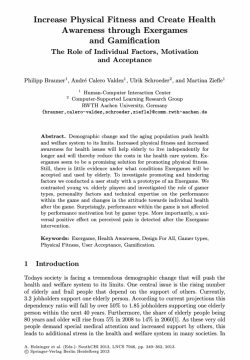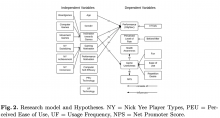
Abstract
Demographic change and the aging population push health and welfare system to its limits. Increased physical fitness and increased awareness for health issues will help elderly to live independently for longer and will thereby reduce the costs in the health care system. Exergames seem to be a promising solution for promoting physical fitness. Still, there is little evidence under what conditions Exergames will be accepted and used by elderly. To investigate promoting and hindering factors we conducted a user study with a prototype of an Exergame. We contrasted young vs. elderly players and investigated the role of gamer types, personality factors and technical expertise on the performance within the game and changes in the attitude towards individual health after the game. Surprisingly, performance within the game is not affected by performance motivation but by gamer type. More importantly, a universal positive effect on perceived pain is detected after the Exergame intervention.
Brauner, P., Calero Valdez, A., Schroeder, U., Ziefle, M.: Increase Physical Fitness and Create Health Awareness through Exergames and Gamification. The Role of Individual Factors, Motivation and Acceptance. In: Holzinger, A., Ziefle, M., and Glavinić, V. (eds.) Proceedings of the SouthCHI 2013, LNCS 7946. pp. 349–362. Springer-Verlag Berlin Heidelberg, Maribor, Slovenia (2013). https://doi.org/10.1007/978-3-642-39062-3_22.
Related Project(s):


